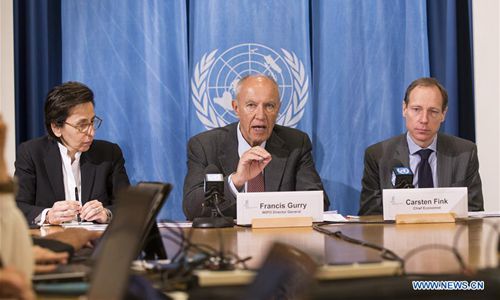
World Intellectual Property Organization (WIPO) Director General Francis Gurry (center) speaks during a press conference in Geneva, Switzerland, March 18, 2019. File Photo:Xinhua
Ahead of a closely watched election next week that might produce the first Chinese national to head the UN's World Intellectual Property Organization (WIPO), Chinese authorities and IP experts have warned the US over its "immoral" and unfair move to prevent China, which has over the years emerged as the global frontrunner for patents, from winning the election.
China's Foreign Ministry on Tuesday rebuked the US move to sabotage China's nomination for the head of a UN agency for intellectual property amid the coronavirus outbreak.
In a bid to suppress China, the US has spared no efforts to pressure some countries to abandon support for the Chinese candidate, even threatening to stop aid, among other dishonorable means of intimation or extortion, Foreign Ministry spokesperson Zhao Lijian told a regular press conference.
While China is in the midst of a nationwide fight against COVID-19, the US joins hands with some countries to block and sabotage China's nomination, a grossly immoral act, Zhao stressed.
The spokesman's remarks came after the US continued maximum pressure in its self-sought feud with China over the election of the new WIPO head.
The US is working to block China from taking the top post of the organization, according to a Bloomberg report last week.
"The US believes that giving control of WIPO to a representative of China would be a terrible mistake," White House trade adviser Peter Navarro wrote in an article recently published by the Financial Times.
The intellectual property agency is an international organization rather than a US proprietary asset, Tao Xinliang, honorary dean of the Intellectual Property Institute of Shanghai University, said, arguing against unreasonable and inappropriate actions taken by the US.
The attempt to sway the election is "a concrete indication of Trump's 'America First' policy", as the US is apparently moving to unfairly contain China in the IP sphere, Tao told the Global Times on Tuesday.
The organization is scheduled to elect a new director-general for a period of six years in early March to succeed Francis Gurry, the current head from Australia who would step down in September.
In November 2019, China nominated Wang Binying, currently a WIPO deputy director-general, who has worked for the organization for nearly 30 years, to head the agency.
If Wang wins the election, she would be the first Chinese national and the first female to head the agency since its creation in 1967.
Hailing Wang as the most experienced, capable and competitive candidate, Zhao said the nomination also comes in line with expectations for more outstanding females to lead international organizations.
Wang could bring unique expertise and insight that would help the agency to further its mission and promote IPR protection around the world, said Shan Xiaoguang, dean of Shanghai International College of IP at Tongji University.
"In promoting IPR protection in developing countries, she has extensive experience and broad vision. She can not only see the requirements of developed countries but also feel the strong pursuit by developing countries to improve their IPR protection environment," Shan told the Global Times on Tuesday, noting that Wang's leadership would be perfectly balanced between developing and developed countries.
China's marked progress in the global IP arena is also believed to strengthen the case for the nation's leadership in the UN-created agency.
China is a global innovation and intellectual property power and the nation's nomination of a candidate to head the organization exemplifies China's aspiration to contribute to international IP cooperation and development, Zhao said at Tuesday's press conference.
More than 1.4 million patent applications were filed in 2019, with 453,000 of them approved - an increase of 4.8 percent year-on-year, showed data from the National Intellectual Property Administration (NIPA). Huawei, Sinopec, and Oppo topped the rankings for new approved patents filed by domestic firms last year.
In another sign, patent applications filed by overseas entities rose by 6 percent year-on-year to 157,000 in 2019, while trademark applications filed by them jumped 4.7 percent to 255,000, official data showed.
Japan, the US, and Germany were the top countries last year in terms of patent applications, while the US, Japan and Britain led the way in trademark applications.
Also, China's added value of patent-intensive industries hit over 10 trillion yuan ($1.42 trillion) in 2018, contributing more than 15 percent to GDP growth.
As Tao at Shanghai University put it, as an industry veteran with over 35 years' experience in the intellectual property field, he has witnessed the nation's marked progress in aligning with global IPR.
The total number of patent applications filed in China recorded an average annual growth rate of over 18 percent between 1985 and 2019, while the reading for patents approved during the same period was 30-plus percent, according to the NIPA figures.
The US, for narrow political purposes, arrogantly smears and suppresses China however, remarked the FM spokesman, "we can't help asking who bestowed the US with the power to turn a professional election into a political farce?"
Without its own candidates, the US only has the right to decide on its own vote, he said, noting that China believes all countries upholding justice will resolutely stand against the US' immoral act and ensure the election is carried out in a fair and just manner.
Criticism from the US ahead of the election for the next director general of the WIPO is biased and politically motivated, Shan stressed.
"China established a system for IPR protection that is completely in line with global standards within just a very short period of time. That is recognized by many around the world," he said, "but the thing the US does not say out loud is that because of the trade [issues], the US would always nitpick no matter how well China has done it."
